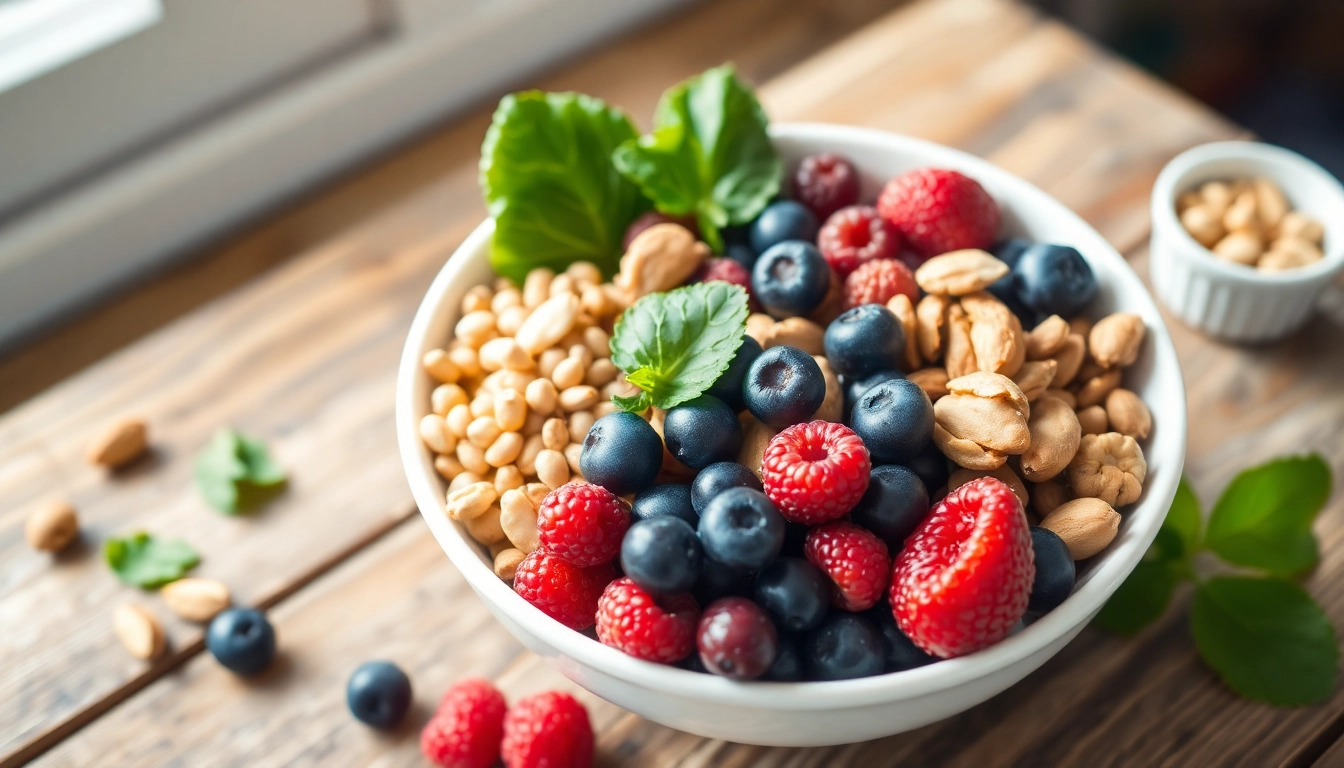Boost Your Health with These Essential Anti-Inflammatory Foods and Tips

Understanding Inflammation and Its Impact on Health
Inflammation is the body’s response to injury, infection, or irritation. It is a biological process that involves the activation of the immune system, aimed at protecting the body. However, when inflammation becomes chronic, it can lead to various diseases, including heart disease, arthritis, and even cancer. Understanding how to manage and reduce inflammation through dietary choices is crucial for maintaining overall health. Incorporating antiinflammatory foods into your meals can be an effective strategy.
What is Inflammation?
Inflammation is a complex biological response characterized by redness, swelling, heat, and pain. It serves as a protective mechanism, allowing the body to fight off harmful pathogens and promote healing. Acute inflammation occurs in response to an injury or infection and usually resolves once the threat is eliminated. Chronic inflammation, on the other hand, lasts for prolonged periods and can occur even in the absence of injury or infection, leading to various health issues.
Common Causes of Inflammation
Several factors can trigger inflammation, including:
- Infections: Bacteria, viruses, and other pathogens can induce an inflammatory response.
- Injuries: Cuts, burns, and physical trauma can provoke inflammation as part of the healing process.
- Chronic conditions: Diseases like obesity and diabetes are associated with prolonged inflammation.
- Diet: Processed foods, high sugar, and unhealthy fats can contribute to inflammation.
- Environmental factors: Pollution, toxins, and allergens can also lead to inflammatory responses in the body.
Why Anti-Inflammatory Solutions Matter
Addressing inflammation is critical for preventing chronic health conditions and enhancing quality of life. Anti-inflammatory solutions, particularly through diet, can reduce the risk of diseases while improving body functions. Foods rich in antioxidants and omega-3 fatty acids have been shown to exert anti-inflammatory effects, supporting overall wellness.
Key Anti-Inflammatory Foods to Incorporate
Incorporating specific foods into your diet can significantly enhance your body’s ability to combat inflammation. Here are key food groups known for their anti-inflammatory properties.
Fruits and Vegetables That Help
Fruits and vegetables are packed with vitamins, minerals, and antioxidants that combat inflammation. Here are some top choices:
- Berries: Blueberries, strawberries, and raspberries contain high levels of antioxidants that fight oxidative stress.
- Leafy Greens: Spinach, kale, and collards are rich in vitamins E and C, both of which are vital for reducing inflammation.
- Beets: Loaded with betalains, which reduce oxidative stress and inflammation in the body.
- Avocado: High in monounsaturated fats and antioxidants that have anti-inflammatory effects.
Healthy Fats for Reducing Inflammation
Not all fats are created equal. Healthy fats, particularly those from plant sources and fatty fish, can help reduce inflammation:
- Olive Oil: Rich in oleocanthal, an anti-inflammatory compound similar to ibuprofen.
- Fatty Fish: Salmon, mackerel, and sardines are excellent sources of omega-3 fatty acids.
- Nuts and Seeds: Walnuts, flaxseeds, and chia seeds provide omega-3s and fiber, further contributing to an anti-inflammatory diet.
Whole Grains and Their Benefits
Whole grains are an excellent source of fiber, which is beneficial in reducing inflammation. Key whole grains to include are:
- Brown Rice: A good source of magnesium and fiber.
- Quinoa: Easily digestible and rich in protein and fiber.
- Oats: High in beta-glucan, a type of soluble fiber that may reduce inflammation.
Crafting an Effective Anti-Inflammatory Diet
Creating an anti-inflammatory diet involves understanding its basic principles and finding practical ways to implement them in your lifestyle.
Basic Principles of an Anti-Inflammatory Diet
At its core, an anti-inflammatory diet emphasizes whole foods over processed ones. Key principles include:
- Eat the Rainbow: Fill your plate with a variety of colorful fruits and vegetables.
- Choose Whole Grains: Opt for whole grains instead of refined carbohydrates.
- Incorporate Healthy Fats: Prioritize sources of omega-3 fatty acids and monounsaturated fats.
- Minimize Sugar and Processed Foods: Limiting sugar and processed food consumption can significantly reduce inflammation.
Meal Planning Tips for Success
Planning your meals can help you stick to an anti-inflammatory diet. Here are some tips:
- Prepare Meals Ahead: Set aside time each week to prepare a few meals in advance.
- Include a Variety: Try to prepare meals with different fruits, vegetables, and grains to keep it interesting.
- Make a Shopping List: Write down anti-inflammatory foods to help guide your grocery shopping.
Recipes and Ideas for Anti-Inflammatory Meals
Here are a few simple anti-inflammatory meal ideas:
- Breakfast: Overnight oats topped with berries and chia seeds.
- Lunch: Quinoa salad with spinach, avocado, and cherry tomatoes, drizzled with olive oil.
- Dinner: Grilled salmon served with steamed broccoli and a side of brown rice.
- Snacks: A handful of walnuts or a smoothie made with spinach, banana, and almond milk.
Supplementing Your Anti-Inflammatory Strategy
In addition to dietary changes, certain herbs, spices, and supplements can further enhance your anti-inflammatory strategy.
Herbs and Spices to Include
Incorporating herbs and spices into your meals can reduce inflammation effectively:
- Turmeric: Contains curcumin, known for its strong anti-inflammatory properties.
- Ginger: Helps reduce inflammation and can alleviate some symptoms of arthritis.
- Cinnamon: Contains antioxidants and has anti-inflammatory effects.
Understanding Anti-Inflammatory Supplements
While it’s best to get nutrients from food, some supplements can help enhance your anti-inflammatory efforts:
- Fish Oil: Omega-3 fatty acids from fish oil supplements can lower inflammation markers in the body.
- Curcumin Supplements: Concentrated curcumin extracts can offer potent anti-inflammatory benefits.
- Vitamin D: Adequate levels of vitamin D can also play a role in modulating inflammation.
When to Consult a Healthcare Provider
If you are considering significant dietary changes or adding supplements to your routine, it’s crucial to consult with a healthcare provider, especially if you have underlying health conditions or are on medication.
Staying Consistent and Tracking Progress
Maintaining an anti-inflammatory lifestyle requires perseverance and consistency. Tracking your progress can help you stay motivated.
Strategies for Maintaining an Anti-Inflammatory Lifestyle
To help maintain your anti-inflammatory lifestyle, consider the following strategies:
- Keep a Food Journal: Note what you eat and how you feel after meals to identify potential triggers and beneficial foods.
- Set Goals: Set realistic goals to gradually incorporate more anti-inflammatory foods into your diet.
- Mindfulness Practices: Incorporate stress-reducing techniques such as yoga or meditation that can also promote an anti-inflammatory lifestyle.
Monitoring Results and Adjusting Your Diet
Pay close attention to the changes in your body when you adopt an anti-inflammatory diet. Adjust your food intake based on your energy levels, mood, and any symptoms you experience. It’s crucial to stay flexible and adapt to what works best for your body.
Community Support and Resources
Engaging with a community focused on health and wellness can provide additional motivation and resources. Consider joining online forums, local health groups, or social media communities dedicated to anti-inflammatory living.



Leave a Comment